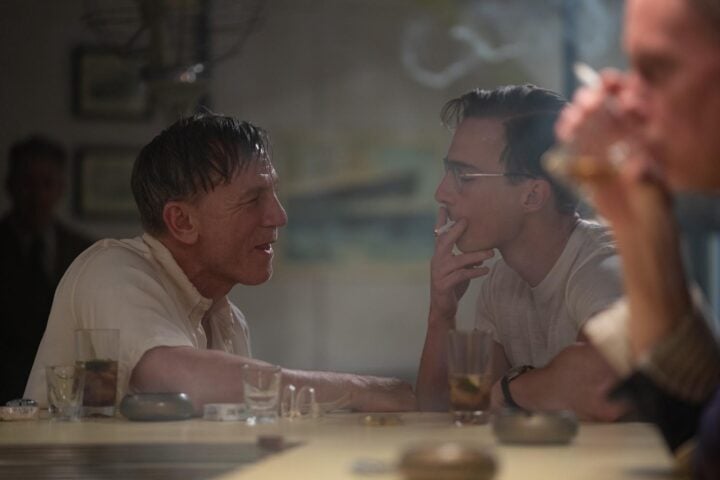Comedies often depend on precision, with jokes popping off like synchronized gunfire, though in Between the Temples, Nathan Silver stretches moments out to revel in texture and give his actors room to breathe. The film, written by Silver and C. Mason Wells, is a marvel of lived-in shagginess, of clashing, cacophonous tones that reveal characters’ inner furies. Between the Temples is funny and even suspenseful in its unpredictability, as you never quite know when and where the punchlines will land. The film revels in the volatile human comedy of which John Cassavetes, an obsessive miner of neurotic minutiae, might approve.
Take a scene in which a grieving widower, Ben (Jason Schwartzman), goes to lunch with his childhood music teacher, Carla (Carol Kane). Silver captures them eating in close-up, as they talk about their wonderful burgers, for much longer than most filmmakers would dare. The scene’s punchline—that Ben, the cantor at his local synagogue, accidentally eats meat and cheese together, which isn’t kosher—is nearly lost among the din of their chewing and gabbing.
The rapid editing between close-ups of the two of them has a hypnotic pull that pushes past absurdity into poignancy. Marked by disappointment and trauma, Ben and Carla find profound pleasure in those burgers. Food may be dribbling out of their mouths, but Silver doesn’t evince revulsion or aim for a cheap gag, because struggling to say something important with a mouth full of fast food is, among other things, human. Silver is interested in the savory, earthly, oddball pleasures that can lead the alienated among us back to the shore of stability.
Silver has a gambler’s faith in his actors and situations that sets him apart from most artists. Many contemporary filmmakers have aped the aesthetics of touchstone American films of the 1970s, though those films are often orchestrated with a degree of self-consciousness that roots them in the preachy and plot-driven cinema of today. Alexander Payne’s The Holdovers, for one, is a lovely character study mounted in the key of a vintage Hal Ashby movie that nonetheless feels intensely intended. Despite its best efforts, it never quite shakes the feel of ’70s-era karaoke. Every scene in The Holdovers hits its preordained mark and moves onward.
Meanwhile, Silver seems to follow his characters where they need to go, leaving loose ends and longings hanging. Ben, who’s lost his singing voice in a metaphorical gambit that the film’s screenplay wisely underplays, is coached by Carla to push air up from this stomach. Carla touches his stomach as he lies down on a table, and they volley dialogue back and forth in a tennis match of sorts that culminates with him touching her stomach in return. It’s a brief, subtle, unaccountably erotic moment that captures how attraction can spark anywhere, anytime. In a contemporary culture that’s often so relentlessly pushing messages on us, Silver’s willingness to let you feel your way through a scene feels miraculous.
Comedy is hard enough. Empathetic comedy that doesn’t go soft or maudlin is harder still, and Silver with his stylish character studies is cornering the market on it. On paper, Between the Temples sounds cutesy, even crass: a rom-com with festival-ready quirk about a despairing cantor falling in love with his former music teacher, while preparing her for the bat mitzvah she never got around to having. Ashby’s Harold and Maude springs to mind, at least in terms of the May-December angle, yet that film’s mixture of fatalism and sentiment has always felt like a crock. Silver is more matter-of-fact about how people of all walks of life can make sense together, honoring the chaos of the romantic comedy at its best, which can remind us of how our unexpected passions can reveal new facets of our personality to ourselves.
Silver is also less sentimental than the Ashby of Harold and Maude, as this love story is also a wicked play on Jewish mother jokes. Ben has two mothers (Caroline Aaron and Dolly de Leon), with whom he’s very close and currently living, and his pseudo-romance with Carla partially feels like a need for him to have as much “mother” in his life as possible. We’re in the morbid-erotic territory here of Philp Roth and Woody Allen—associations that are underscored by an audacious sequence in which Ben roleplays sex with his dead wife with a new lover, Gabby (Madeline Weinstein). But Silver never seems as if he has a score to settle. Between the Temples finds him mining incendiary material without losing the unstudied niceness that’s always been so bracing in his films. Silver’s casual touch with loaded material is what’s so freeing and funny.
Above all, the film is a study of Schwartzman and Kane, who pair beautifully, feeling each other out with a dizzying array of vocal rhythms. Schwartzman, often so fast and prickly with his barbs, is slower and more freighted in his deliveries here, while Kane, who’s often asked to lean into her unusually high voice, goes lower and deeper, foregrounding her cuckoo sensuality. John Magary’s editing is split-second fast, chopping exploratory riffs into shards of screwball rat-a-tat, while Sean Price Williams’s lush 16mm cinematography is warm and hazy and druggy, allowing for the illusion that you’re witnessing the film’s frequent sight gags for yourself.
This wealth of contrasting stimulation gives Between the Temples a singular and intimate atmosphere, in which scenes can last little eternities while still leaving you feeling as if you’re struggling to keep up with a stream of secrets and in-jokes. In other words, Silver makes you feel as if you’re in the presence of real people, haunted by real ghosts, trying to make a go of it.
Since 2001, we've brought you uncompromising, candid takes on the world of film, music, television, video games, theater, and more. Independently owned and operated publications like Slant have been hit hard in recent years, but we’re committed to keeping our content free and accessible—meaning no paywalls or fees.
If you like what we do, please consider subscribing to our Patreon or making a donation.





